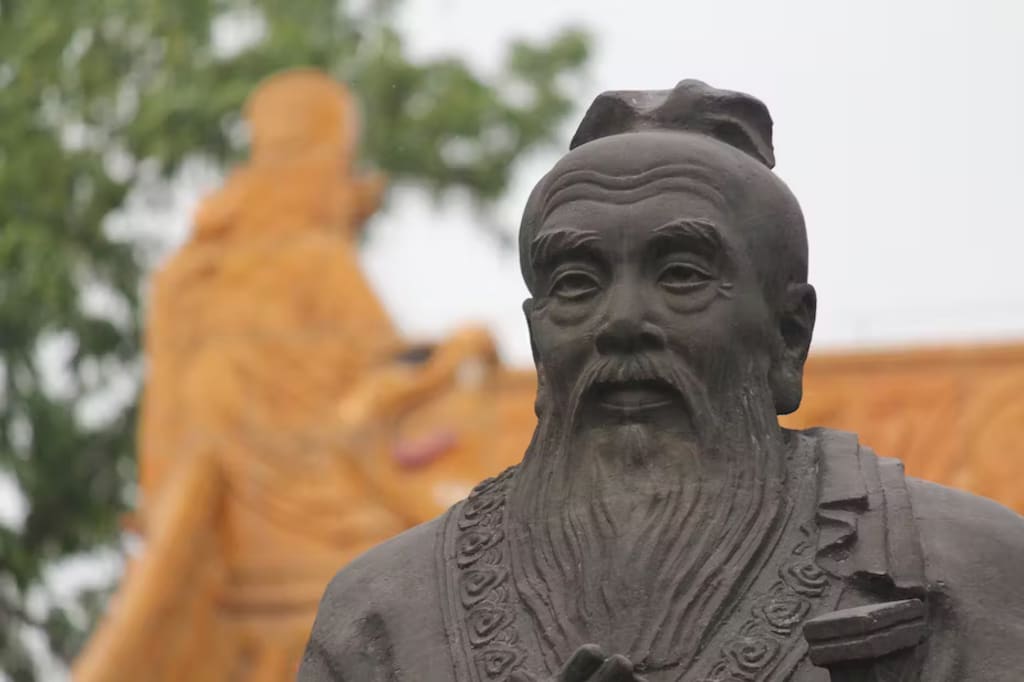The First Teacher
Untold Story of Confucius

There are debates about the first teacher on Earth. But Confucius is considered to be the first teacher of human history.
Confucius, also known as Kong Qiu or Kongzi, was a renowned Chinese philosopher, teacher, and political figure who lived during the Spring and Autumn Periods of Chinese history. Born in 551 BCE in the state of Lu, which is present-day Qufu in China, Confucius is considered one of the most influential thinkers in Chinese history.
Confucius dedicated his life to the pursuit of knowledge, moral development, and the betterment of society. He believed that the key to creating a harmonious and well-ordered society lies in the cultivation of personal virtues and the practice of proper conduct. His teachings revolved around ethical principles, social relationships, and the responsibilities of individuals in society.
As a teacher, Confucius established a school of thought known as Confucianism, which has profoundly shaped Chinese culture, ethics, and governance. His teachings emphasized the importance of moral character, education, and the pursuit of virtue. According to Confucius, individuals should strive for self-improvement and the attainment of moral excellence through continuous learning and self-reflection.
One of the central concepts in Confucianism is the idea of "ren," often translated as "benevolence" or "humanity." Confucius believed that practicing ren involves treating others with kindness, empathy, and moral integrity. He emphasized the importance of developing a sense of compassion and a genuine concern for the well-being of others. Through the cultivation of ren, individuals can contribute to the betterment of their families, communities, and society as a whole.
Confucius also stressed the significance of rituals, proper behavior, and respect for elders. He believed that adhering to proper etiquette and observing rituals helps maintain social order, harmony, and stability. Confucius emphasized the Five Constant Virtues: benevolence, righteousness, propriety, wisdom, and fidelity. These virtues served as guiding principles for individuals in their interactions with others and in the fulfillment of their social roles and responsibilities.
Education played a crucial role in Confucius' philosophy. He believed in the transformative power of education to shape individuals and society. Confucius advocated for a holistic approach to education that encompassed not only intellectual development but also moral and character formation. He emphasized the importance of studying the ancient texts, such as the classics of Chinese literature and history, as a means of gaining wisdom and guidance for ethical living.
Confucius' teachings had a lasting impact on Chinese society and continue to shape various aspects of Chinese life. Confucianism influenced education, family values, government administration, and cultural traditions. Confucius' emphasis on moral values, social harmony, and the cultivation of personal character has had a profound influence on the ethical framework of Chinese society.
Despite facing political challenges and not achieving widespread recognition during his lifetime, Confucius' teachings gained prominence in later centuries. His ideas were compiled in a collection of dialogues and sayings known as the Analects, which became a fundamental text in Confucian philosophy. Confucianism became an official state ideology during the Han dynasty and has remained influential throughout Chinese history.
Confucius is revered as a symbol of wisdom, virtue, and moral integrity. His teachings continue to be studied and respected worldwide, transcending cultural boundaries. Confucius' emphasis on ethics, education, and social harmony resonates with people seeking guidance in leading a meaningful and principled life.
In summary, Confucius was a visionary philosopher and teacher whose teachings continue to inspire and guide individuals in their personal and social lives. His emphasis on moral character, education, and the pursuit of virtue has left a lasting legacy that continues to shape Chinese culture and society. Confucius' profound impact on ethics, governance, and the pursuit of a harmonious society cements his status
as one of the greatest thinkers in Chinese history.
About the Creator
Enjoyed the story? Support the Creator.
Subscribe for free to receive all their stories in your feed. You could also pledge your support or give them a one-off tip, letting them know you appreciate their work.






Comments
There are no comments for this story
Be the first to respond and start the conversation.